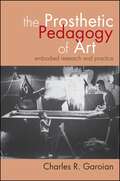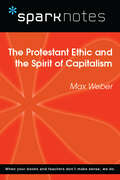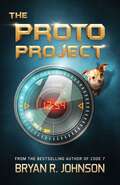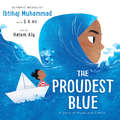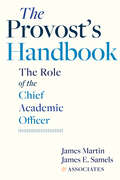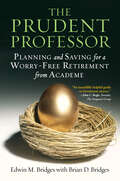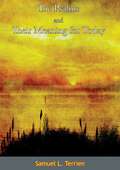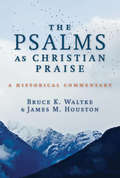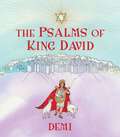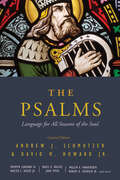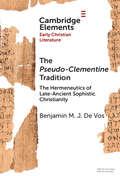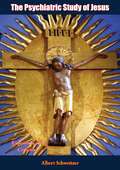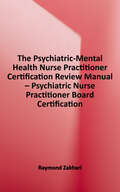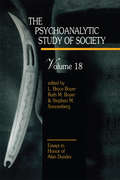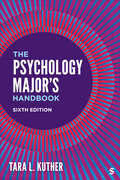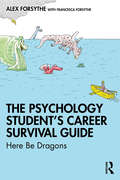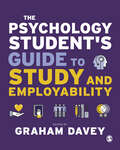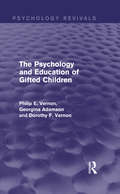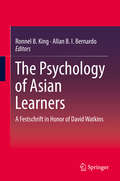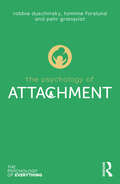- Table View
- List View
The Prosthetic Pedagogy of Art: Embodied Research and Practice
by Charles R. GaroianBy beginning each chapter of The Prosthetic Pedagogy of Art with an autobiographical assemblage of personal memory and cultural history, Charles R. Garoian creates a differential, prosthetic space. Within these spaces are the particularities of his own lived experiences as an artist and educator, as well as those of the artists, educators, critics, historians, and theorists whose research and creative scholarship he invokes—coexisting and coextending in manifold ways. Garoian suggests that a contiguous positioning of differential narratives within the space of art research and practice constitutes prosthetic pedagogy, enabling learners to explore, experiment, and improvise multiple correspondences between and among their own lived experiences and understandings, and those of others. Such robust relationality of cultural differences and peculiarities brings about interminable newness to learners' understanding of the other, which challenges the intellectual closure, reductionism, and immutability of academic, institutional, and corporate power.
The Protestant Ethic and the Spirit of Capitalism (SparkNotes Philosophy Guide)
by SparkNotesThe Protestant Ethic and the Spirit of Capitalism (SparkNotes Philosophy Guide) Making the reading experience fun! SparkNotes Philosophy Guides are one-stop guides to the great works of philosophy–masterpieces that stand at the foundations of Western thought. Inside each Philosophy Guide you&’ll find insightful overviews of great philosophical works of the Western world.
The Proto Project: A Sci-Fi Adventure of the Mind
by Cynthea Liu Bryan R. JohnsonWhen Jason meets his mom’s billion-dollar invention, an artificial intelligence device named Proto, he accidentally gets caught up in a mysterious adventure. Proto goes missing, and then people go missing. Now Jason and his coolest-neighbor-ever Maya must risk their lives to prevent global mayhem. But who is behind this devious plot? Is it another AI? The FBI? Or any other abbreviation with an I? What exactly is there to learn about artificial and human intelligence while fighting for your life against a legion of furry puppies or a battalion of drones? A lot— if you live to tell about it. <p><p>Lexile score 600L-700L DRA 28 <p>Guided Reading Level N <p>Age Level: 8 and up Grade Level: 3 and up
The Proudest Blue: A Story of Hijab and Family
by Ibtihaj MuhammadA powerful, vibrantly illustrated story about the first day of school--and two sisters on one's first day of hijab--by Olympic medalist and social justice activist Ibtihaj Muhammad. With her new backpack and light-up shoes, Faizah knows the first day of school is going to be special. It's the start of a brand new year and, best of all, it's her older sister Asiya's first day of hijab--a hijab of beautiful blue fabric, like the ocean waving to the sky. But not everyone sees hijab as beautiful, and in the face of hurtful, confusing words, Faizah will find new ways to be strong.Paired with Hatem Aly's beautiful, whimsical art, Olympic medalist Ibtihaj Muhammad and Morris Award finalist S.K. Ali bring readers an uplifting, universal story of new experiences, the unbreakable bond between siblings, and of being proud of who you are.
The Provost's Handbook: The Role of the Chief Academic Officer
by James Martin James E. SamelsA go-to resource to help provosts, deans, presidents, and trustees effectively meet the challenges of leading a college or university.As the chief academic officer, the provost plays the central role in the contemporary university or college. He or she leads the faculty and serves as their key representative to the administration while simultaneously acting as the administration's spokesperson to the academic faculty. How has this essential leadership position evolved over the past few decades, and what are the best practices to adopt for succeeding in specific operational areas?In seventeen essays written by some of the most successful chief academic officers in the United States, The Provost's Handbook outlines key topics related to the changing environment of higher education while explaining what constitutes effective leadership at the college and university level. How, for example, does the provost lead in a time of disruption and shifting needs? What skills should he or she nurture in new faculty? What role should data and institutional research play in decision making? How can a provost navigate the often stormy situations of shared governance? These questions—and many more challenges presented by this role—are addressed in this essential volume. Assembled by James Martin and James E. Samels, accomplished authors and scholars of leadership in higher education, The Provost's Handbook is destined to become the go-to resource for deans, presidents, trustees, and chief academic officers everywhere.
The Prudent Professor: Planning and Saving for a Worry-Free Retirement from Academe
by Edwin M. Bridges Brian D. BridgesThis is a guide for anyone in the academy – faculty member, administrator or professional staff – at whatever point she or he may be along the career path. Whether you are a newly-minted Ph.D. landing your first job, at mid career, or even already retired and concerned about how long your money might last, Ed Bridges offers you a straightforward, easy-to-grasp, and structured way to think about money, learn how it works, understand the priorities for your stage in life, determine your objectives, and develop a personal plan most likely to achieve them.Why a book specifically for those who work in higher education? The chances are that your retirement funds are mostly invested in TIAA-CREF funds, and that the plans created by the different institutions where you have worked, or will work, impose sometimes conflicting limitations of how you can manage your retirement money. This is potentially complex terrain with which many professional financial advisors are unfamiliar. This book provides ample guidance for you to manage your retirement funds, but if you do prefer to seek professional advice, it sets out the criteria for choosing a reliable advisor, and may even be a book from which your advisor can benefit if he or she is not fully conversant with TIAA-CREF’s offerings, and the quirks of academic retirement plans.What makes this book unique is that Ed Bridges shares with you his self-education about the risky business of investing and retirement planning. As he writes, “In schooling myself, I adopted the mind-set that I had used as a social scientist for the past forty-six years. I distinguished between fact and opinion and scrutinized the evidence behind every author’s claims; moreover, I searched for research that might corroborate or refute these claims. In the process, I learned a great deal about the route I should have taken to retirement from the time I accepted my first academic appointment to the time I submitted my intention to retire. Join me as I relive my long journey so that you may avoid my wrong turns and succeed in reaching your ultimate destination, a worry-free retirement, despite the risks and uncertainties you will surely face when you retire.”The book includes simple questionnaires and worksheets to help you determine where you stand, and think through your options.
The Psalms and Their Meaning for Today
by Samuel L. TerrienTHE vitality of the Hebrew Psalms in the worship life of the Western world is a noteworthy and almost enigmatic fact. No other book of hymns and prayers has been used for so long a time and by so many diverse men and women. Here is an anthology of religious poems composed and collected in a remote land many centuries ago. The Temple of Jerusalem, in whose shadow most of their poets lived, has remained destroyed for more than fifty generations. Its cultic pageantry and ritual, of which the Psalms were the theological expression and lyrical adornment, have gone the way of ancient Babel and Memphis. Yet this archaic hymnal has survived the cult for which it was created.Today the Hebrew Psalms are read, chanted, or sung by countless people, every day of the year and everywhere on the face of the earth. They constitute the core of personal prayer and corporate adoration for all forms of Judaism—Orthodox, Conservative, Reformed—and for all churches of Christendom—Greek, Roman, Protestant. Such an enduring and widespread power of survival may be claimed for no other book of poetry and song.
The Psalms as Christian Praise: A Historical Commentary
by Bruce K. Waltke James M. HoustonTwo respected scholars explore the heart of the PsalmsFollowing in the style of their companion volumes, The Psalms as Christian Worship and The Psalms as Christian Lament, Bruce Waltke and James Houston now explore the depths of Christian praise. Each volume uniquely blends verse-by-verse commentary with a history of Psalms interpretation in the church from the time of the apostles to the present. Since praise is the essence of the book of Psalms, Waltke and Houston have narrowed the focus to Book IV of the Psalter (Psalms 90-106), which magnify God and proclaim him king. To give voice to the psalmist, the authors (carefully) translate and explain each psalm and summarize its theological message. This is followed by listening to the voice of godly churchmen whose comments have stood the test of time. The Psalms as Christian Praise is ideal for anyone seeking to better understand the praise of Israel as found in the Psalms and how Christians also use these Psalms in worship.
The Psalms as Christian Praise: A Historical Commentary
by Bruce K. Waltke James M. HoustonTwo respected scholars explore the heart of the PsalmsFollowing in the style of their companion volumes, The Psalms as Christian Worship and The Psalms as Christian Lament, Bruce Waltke and James Houston now explore the depths of Christian praise. Each volume uniquely blends verse-by-verse commentary with a history of Psalms interpretation in the church from the time of the apostles to the present. Since praise is the essence of the book of Psalms, Waltke and Houston have narrowed the focus to Book IV of the Psalter (Psalms 90-106), which magnify God and proclaim him king. To give voice to the psalmist, the authors (carefully) translate and explain each psalm and summarize its theological message. This is followed by listening to the voice of godly churchmen whose comments have stood the test of time. The Psalms as Christian Praise is ideal for anyone seeking to better understand the praise of Israel as found in the Psalms and how Christians also use these Psalms in worship.
The Psalms of King David
by DemiThe Bible tells us that King David was a man after God&’s own heart (1 Samuel 13:14), chosen by Him to lead his people Israel. David began life as a simple shepherd, but his fearless courage and unshakeable faith in God would see him slay the Philistine giant Goliath and become a celebrated warrior. After the death of King Saul, the Lord God would establish David as king over Israel. Soon, he would go on to conquer the fortress city of Jerusalem and install the Ark of the Covenant within its walls. But, above all, King David would be remembered as the inspired poet and harpist who composed the Biblical Psalms to the Lord his God. Award-winning author, Demi, recounts the dramatic story of David, the shepherd who rose to become king.
The Psalms: Language for All Seasons of the Soul
by Andrew J. Schmutzer David M. Howard Jr.The Psalms: Language for All Seasons of the Soul brings together essays from eighteen Old Testament scholars discussing the latest in Psalms scholarship and applying exegetical insights to the life of faith. These essays explore the full range of emotion expressed in the Psalms—from elation to distress—while weaving together observations from biblical scholarship and theology. The reader will gain valuable insights into how the Psalms speak to his or her soul. The book is divided into five sections that:Give an overview of Psalms studies in the 21st centuryDiscuss psalms of praiseExplore psalms of lamentLook at the big picture of the Psalter as a bookPresent sermons on the Psalms that are models of evangelical engagement with the text. A Select Bibliography for Psalms Study is included at the end of the book.
The Psalms: Language for All Seasons of the Soul
by Andrew J. Schmutzer David M. Howard Jr.The Psalms: Language for All Seasons of the Soul brings together essays from eighteen Old Testament scholars discussing the latest in Psalms scholarship and applying exegetical insights to the life of faith. These essays explore the full range of emotion expressed in the Psalms—from elation to distress—while weaving together observations from biblical scholarship and theology. The reader will gain valuable insights into how the Psalms speak to his or her soul. The book is divided into five sections that:Give an overview of Psalms studies in the 21st centuryDiscuss psalms of praiseExplore psalms of lamentLook at the big picture of the Psalter as a bookPresent sermons on the Psalms that are models of evangelical engagement with the text. A Select Bibliography for Psalms Study is included at the end of the book.
The Pseudo-Clementine Tradition: The Hermeneutics of Late-Ancient Sophistic Christianity (Elements in Early Christian Literature)
by Benjamin M. De VosThis Element, through detailed example, scrutinizes the exact nature of Christian storytelling in the case of the Greek Pseudo-Clementines, or Klementia, and examines what exactly is involved in the correct interpretation of this Christian prose fiction as a redefined pepaideumenos. In the act of such reconsideration of paideia, Greek cultural capital, and the accompanying reflections on prose literature and fiction, it becomes clear that the Klementinist exploits certain cases of intertextual and meta-literary reflections on the Greek novelistic fiction, such as Chariton's Chaereas and Callirhoe and Achilles Tatius' Leucippe and Cleitophon, in order to evoke these reconsiderations of storytelling, interpretive hermeneutics, and one's role as a culturally Greek reader pepaideumenos. This Element argues that the Klementia bears witness to a rich, dynamic, and Sophistic context in which reflections on paideia, dynamics regarding Greek identity, and literary production were neatly intertwined with reflections on reading and interpreting truth and fiction.
The Psychiatric Study of Jesus: Exposition and Criticism
by Albert SchweitzerFor His Doctoral Thesis, Schweitzer Chose To Write On Recent Medical Treatises Which Showed, At Least To The Authors' Satisfaction, That Jesus Was Mentally Diseased. The Book Was Published In German In 1913.“Work of a major prophet....Dr. Schweitzer demolishes the published theories that Jesus was mentally abnormal....His uses of his sources are a delight to follow.”—St. Louis Star-Times“It is a monument to the many-sided genius of one of the truly great men of this century. English-speaking people throughout the world will be grateful for this translation.”—Quarterly Review of Biology“The very brevity of this small volume reflects the genius of Albert Schweitzer....At no point does the author appeal to the authority of revealed religion. He meets naturalists on their own grounds....The smooth translation and Introduction by Charles R. Joy and the instructive Preface by Dr. Winfred Overholser enrich the reader’s comprehension and enjoyment of this classic essay”—Dr. Gordon W. Allport, Harvard University“No one is better qualified to speak of the revolutionary personality of Jesus than Schweitzer.”—Boston Herald“Terse, lucid exposition.”—Washington Star
The Psychiatric-Mental Health Nurse Practitioner Certification Review Manual
by Raymond ZakhariThis review manual prepares students to successfully pass the ANCC Psychiatric-Mental Health Nurse Practitioner board certification examination. It encompasses all of the essential knowledge required, uses a succinct outline format that highlights critical detail, and systematically follows the test blueprint so that those taking the exam will be optimally prepared. The review manual begins with an overview of the certification examination, self-care, and test tips; the role of the psychiatric-mental health nurse practitioner, the scope of practice, and regulations; and the theoretical foundations of care. Other topics examined include the neuroanatomy and physiology of mental illness; psychopharmacology; physical assessment, diagnostic tests, and differential diagnosis. A wide range of psychiatric disorders, as organized in the DSM-5, are also reviewed. Each of the chapters includes learning objectives, easy-to-read outline format, and end-of-chapter review questions. The review manual concludes with a 150-question practice test. Key Features: - Reflects the latest ANCC test blueprint - Includes test-taking strategies and tips for preparing for the big day; scope of practice; and theoretical foundations of care - Covers a wide range of psychiatric disorders, as organized in the DSM-5 - Includes end-of-chapter review questions and rationales, PLUS a valuable 150-question practice test with rationales―more than 400 questions in total - Purchase includes access to the eBook for use on most mobile devices or computers
The Psychoanalytic Study of Society, V. 18: Essays in Honor of Alan Dundes
by L. BRYCE BOYER, RUTH M. BOYER AND STEPHEN M. SONNENBERGOpening with a critical appreciation of Alan Dundes (M. Carroll) and Dundes's own cross-cultural study of the cockfight, Volume 18 includes chapters on psychoanalysis and Hindu sexual fantasies (W. Doniger); the modern folk tale "The Boyfriend's Death" (M. Carroll); a gruesome Eskimo bedtime story (R. Boyer); the homosexual implications of Argentinean soccer (M. Suarez-Orozco); and the symbolism of a Malaysian religious festival (E. Fuller).
The Psychologist's Companion for Undergraduates
by Karin Sternberg Robert J. SternbergTailored specifically for undergraduate students, this Companion offers uniquely comprehensive coverage of the topics necessary for successful communication in psychology, making it a valuable resource for research methods and introductory psychology courses. Readers will learn how to effectively plan and write papers in accordance with the latest style guidelines from the Publication Manual of the American Psychological Association, Sixth Edition; present data in posters and talks; and evaluate their own and others' work. The clear writing style and reader-friendly format, meanwhile, allow students to absorb information easily, even when reading chapters selectively or out of order. The book includes numerous up-to-date examples drawn from career experiences to engage students and help them apply what they've learned to forward their own careers, while questions encourage them to think more deeply about larger issues in the field, preparing them for future research.
The Psychology Major′s Handbook
by Tara L. KutherResearch shows that today′s students are unique. Whether anxious, overwhelmed, or too busy to ask for help, modern students trust and turn to the resources at their fingertips for guidance. Tara Kuther created The Psychology Major′s Handbook for this purpose, to bridge the gap between advisor and manual. Created to support and follow along with a student through college, this text provides the support of an advisor as students navigate choosing a major, learning how to study, writing papers, and deciding what to do after college. Within each chapter, Kuther supports learners in applying concepts to their own lives through embedded exercises. The updated Sixth Edition encourages students to take an active role in their education and explains all of the ways that students can influence their own college experiences. Three individual chapters emphasize academics and cover crucial study and college skills, such as writing a review paper, and an APA Style empirical paper. The final four chapters of the text focus on bachelor′s and graduate opportunities to help students to look past graduation.
The Psychology Major′s Handbook
by Tara L. KutherResearch shows that today′s students are unique. Whether anxious, overwhelmed, or too busy to ask for help, modern students trust and turn to the resources at their fingertips for guidance. Tara Kuther created The Psychology Major′s Handbook for this purpose, to bridge the gap between advisor and manual. Created to support and follow along with a student through college, this text provides the support of an advisor as students navigate choosing a major, learning how to study, writing papers, and deciding what to do after college. Within each chapter, Kuther supports learners in applying concepts to their own lives through embedded exercises. The updated Sixth Edition encourages students to take an active role in their education and explains all of the ways that students can influence their own college experiences. Three individual chapters emphasize academics and cover crucial study and college skills, such as writing a review paper, and an APA Style empirical paper. The final four chapters of the text focus on bachelor′s and graduate opportunities to help students to look past graduation.
The Psychology Student’s Career Survival Guide: Here Be Dragons
by Alex ForsytheThe Psychology Student’s Career Survival Guide is designed to aid students in identifying their ideal career pathway and imbue them with the right tools and skills to not only achieve their desired job but to progress and thrive within the workplace. The first half of the book focuses on how to find and get a suitable job. The remaining chapters explore gaining success in the workplace in terms of personal growth, navigating criticism, workplace relations and the critical job assignments that every graduate should pursue. Forsythe, an experienced organisational psychologist, helps students recognise and apply the acquired psychological skill set to develop a personal brand, increase personal visibility and develop professional networks. This smooths the transition from university into the world of work by developing effective working practices that will support personal performance and that of the workplace. This book can also serve as a practical guide for academics looking to bridge the gap between the developing student at university and demands of their future employers. It explicitly calls for vocational elements such as communication, team-working, goal setting and planning within the curriculum. This engaging book comes with an abundance of resources to support students' individual development and to help academics run workshops. These resources include tool kits which include self-diagnostic tools and strengths finders, networking skill development, job search strategies, difficult interview questions, personal branding and so on. This is an essential text for psychology students at all levels looking for employability guidance and for psychology academics who are seeking supportive resources and guidance on helping students achieve their career ambitions.
The Psychology Student’s Guide to Study and Employability
by Graham DaveyHow does a Psychology degree work? Where will it lead me? What skills are employers looking for? Psychology is one of the most popular undergraduate degree subjects in the UK, which is no surprise given the wide range of transferrable skills it offers. But how to translate these skills into job opportunities? And which career paths to explore? If you are considering studying psychology, or you are already a psychology student looking at your next steps, this book is for you. Written by leading academics, this handy guide interweaves both study skills and employability skills, providing advice across all three years of your course and talking you through the different options open to you after graduation. From writing essays to revising for exams, and from careers in and outside of professional psychology to further academic study, this book covers everything a psychology student needs to know – even how to make the most of your social life! Graham Davey is Emeritus Professor of Psychology at the University of Sussex.
The Psychology Student’s Guide to Study and Employability
by Graham DaveyHow does a Psychology degree work? Where will it lead me? What skills are employers looking for? Psychology is one of the most popular undergraduate degree subjects in the UK, which is no surprise given the wide range of transferrable skills it offers. But how to translate these skills into job opportunities? And which career paths to explore? If you are considering studying psychology, or you are already a psychology student looking at your next steps, this book is for you. Written by leading academics, this handy guide interweaves both study skills and employability skills, providing advice across all three years of your course and talking you through the different options open to you after graduation. From writing essays to revising for exams, and from careers in and outside of professional psychology to further academic study, this book covers everything a psychology student needs to know – even how to make the most of your social life! Graham Davey is Emeritus Professor of Psychology at the University of Sussex.
The Psychology and Education of Gifted Children (Psychology Revivals)
by Philip E. Vernon Georgina Adamson Dorothy F. VernonOriginally published in 1977, this book looks at the problem of educating highly intelligent and gifted children, which it felt was of paramount importance to modern society. In the 1970s education increasingly focused on average pupils, and often made excellent provision for handicapped children, the authors felt it all the more important for teachers, parents and educationalists generally to be made aware of the special needs of the bright and talented, and how they could best be catered for. In this book Professor Vernon and his two co-authors discuss the provision of special facilities for the education of these children at the time, particularly with reference to the UK and Canada. The serious losses to society when the gifted and specially talented are ignored or repressed are pointed out and the merits and difficulties of alternative schemes are underlined. Detailed consideration is given to the psychological origins and nature of intelligence (both genetic and environmental) and of creativity and special talents (artistic and scientific), and also to available tests and other techniques for identifying exceptionally able children. The book was particularly intended to help teachers and educational administrators of the time, together with the parents of very bright children.
The Psychology of Asian Learners
by Ronnel B. King Allan B. I. BernardoThis book celebrates the scholarly achievements of Prof. David A. Watkins, who has pioneered research on the psychology of Asian learners, and helps readers grasp the cognitive, motivational, developmental, and socio-cultural aspects of Asian learners learning experiences. A wide range of empirical and review papers, which examine the characteristics of these experiences as they are shaped by both the particularities of diverse educational systems/cultural milieus and universal principles of human learning and development, are showcased. The individual chapters, which explore learners from fourteen Asian countries, autonomous regions, and/or economies, build on research themes and approaches from Prof. Watkins' research work, and are proof of the broad importance and enduring relevance of his seminal psychological research on learners and the learning process.
The Psychology of Attachment (The Psychology of Everything)
by Robbie Duschinsky Pehr Granqvist Tommie ForslundWhat do we actually mean by ‘attachment’? How do different caregiving styles impact attachment in children? How do early caregiving experiences impact later development? The Psychology of Attachment is an essential introduction to attachment, offering an accessible explanation of the theory, unpicking common misunderstandings, and providing a balanced overview of key research findings. Topics covered include the following: The development of attachment during the first few years of life. The impact of different caregiving behaviours on children’s attachment relationships. The influence of attachment relationships on children’s behaviour and development. The development of attachment relationships from infancy to adulthood. Attachment in romantic relationships and religion. Attachment-based interventions. This unique book introduces the reader to new ways of thinking about the role of relationships, caregiving, and child development, and the way in which they shape our lives.
